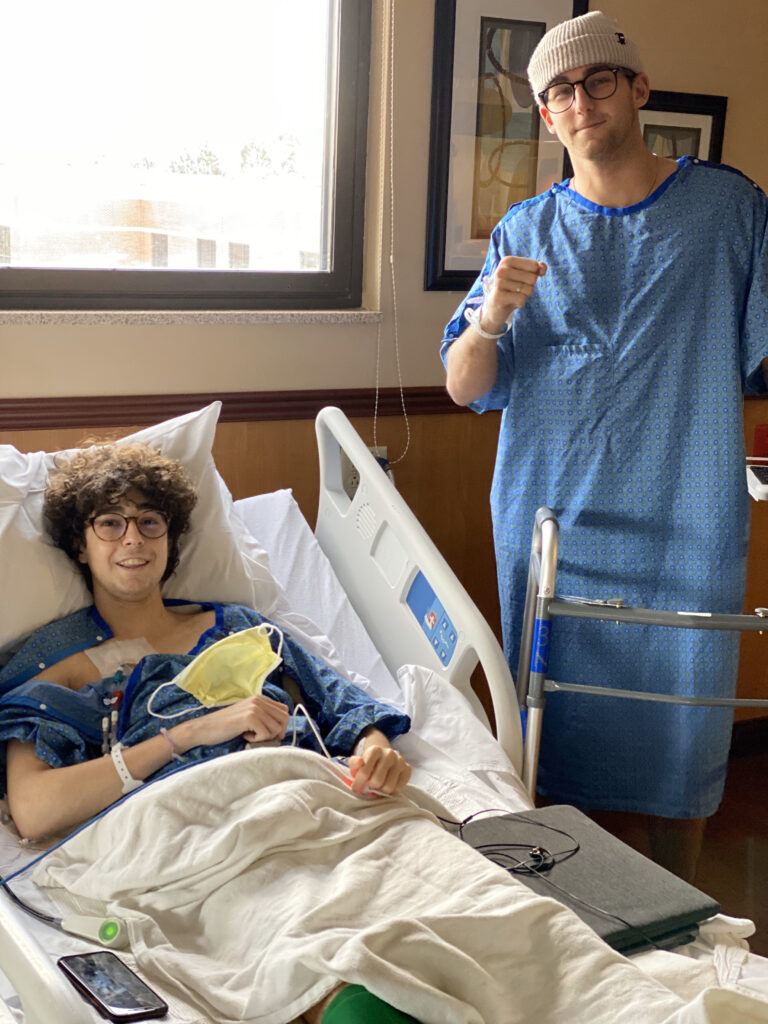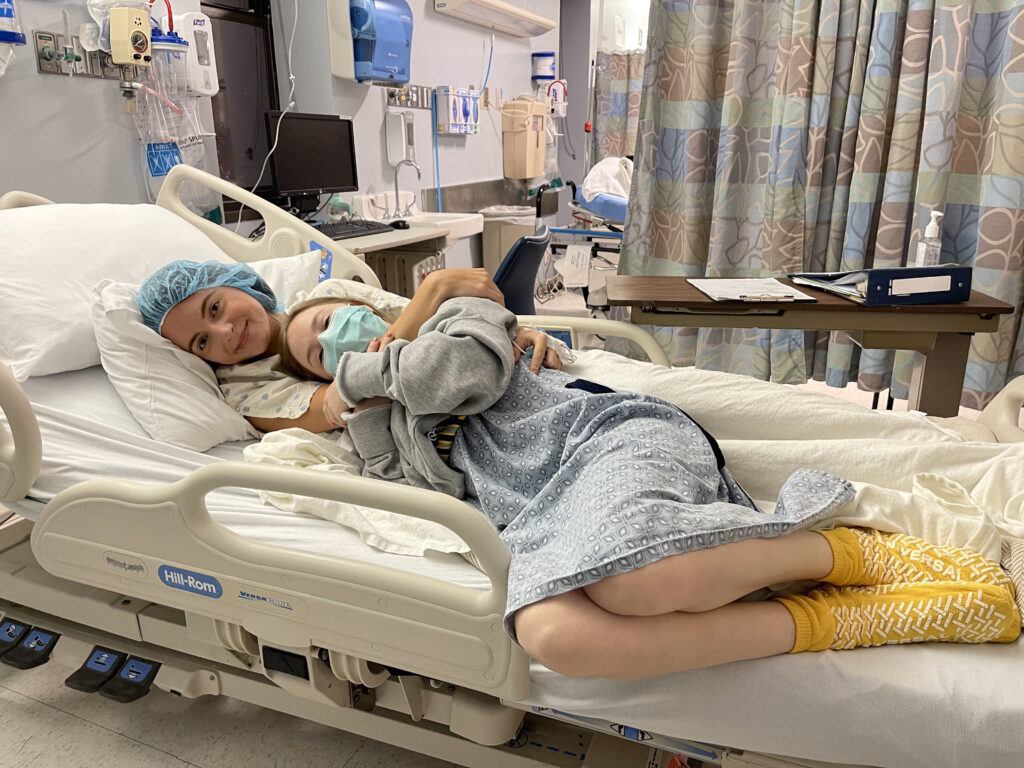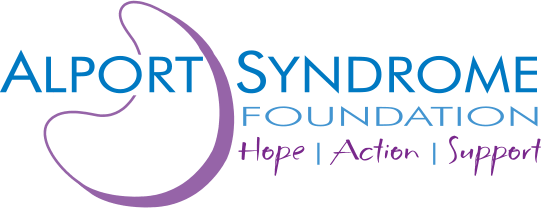Let’s Talk Transplant
According to the Organ Procurement and Transplant Network, as of April 15, 2024, approximately 89,300 individuals in the United States are awaiting a kidney transplant. As national transplant waiting list times can often take years, many patients turn to friends, family, and sometimes even strangers, in their search for a living donor kidney transplant. Education is one of the most powerful tools when it comes to organ donation.
Learn 10 Common Misconceptions about Organ Donation and Transplantation. The Organ Procurement and Transplant Network website allows for a quick search of U.S. transplant clinics near you.
Scroll to the bottom of this page for informative resources and research regarding renal transplants.
To be connected with an individual who has successfully undergone transplant surgery, contact us
Seeking A Living Donor
Asking someone to be a living donor can be one of the most challenging conversations a potential transplant recipient will face. With input from Alport transplant recipients (and their donors), and with the guidance of transplant nephrologist Dr. Alexander Wiseman, ASF created a document outlining considerations when seeking a living kidney donor. Click the blue button below to view.

Getting the Word Out
Those in need of a kidney often simply don’t know how to publicly ask. We’ve compiled some phrasing suggestions below to help patients craft email and social media content, which can also be modified for various other communication methods. Some patients who share messaging online also reach out to, or are contacted by, various media outlets which can extend awareness efforts far beyond one’s own network.
Important Considerations:
- Only share transplant coordinator contact details with their explicit permission. Reaching out to a coordinator for a series of screening questions is typically the first step potential donors can take.
- Consider the creation of a personal email account dedicated to kidney-centric communications.
- If you choose to share personal images along with your messaging, be advised the images may be widely shared and potentially used by those in print/online media.
- Your email can include a brief description of Alport syndrome, for those who are unfamiliar.
- Be sure to clearly provide accurate personal contact information.
- If your transplant clinic has a website with information about their living kidney donor program, that URL can be shared with your messaging.
Email Phrasing Suggestions:
“As some of you may be aware, my family and I are affected by a rare genetic kidney disease called Alport syndrome. At this time, my kidney functional is severely impaired and I am preparing for kidney replacement therapy. What does that mean? With my kidneys unable to function properly, I must either begin dialysis or receive a kidney transplant. The best possible health outcome for me would be to receive a kidney from a living donor. I know this is a tremendous ask. With members of my own family unable to donate due to Alport syndrome, age, and/or other health reasons, I am turning to you. My transplant clinic, ____________ (insert name), is now actively screening donors. The first step would be answering a series of health questions over the phone and, if approved, a simple blood test to assess compatibility. Further testing details and a review of the entire transplant process can be provided by my transplant coordinator. If you are interested in helping, please contact me directly at ________ or my transplant coordinator at ___________.”
Important Considerations:
- If your social media page is set to “private,” be sure to make it “public” so a wider audience can see (and share) your messages.
- Only share transplant coordinator contact details with their explicit permission.
- Frequently check your “other messages” folder with communications from non-followers to ensure you are not missing important kidney donation messages.
- If you choose to share personal images along with your messaging, be advised the images may be widely shared and potentially used by those in print/online media.
Sample Phrasing:
“Seeking a living kidney donor. Are you a match for me? A simple blood test can determine compatibility. Direct message me for more details.”
“Unfortunately, due to my genetic condition, both of my kidneys are no longer functioning as they should. I am seeking a living donor to avoid dialysis. If you, or someone you know, is interested in learning more about the process of kidney donation, please contact me at _______.”
“My kidneys have failed due to Alport syndrome, a rare condition I was born with. As other family members are ineligible to donate for various reasons, I’m turning to my network of friends and maybe even to strangers to find a living kidney donor. If you are interested in being screened as a potential match for me, please call or email me at ______.”

Surgery Preparation
In late 2021/early 2022, a group of Alport syndrome kidney transplant recipients gathered for a series of ASF-hosted virtual meetings to discuss shared experiences and identify gaps in current care. In all, 25 patients of varying ages and backgrounds volunteered to help ASF prepare a new document outlining tips, talking points, and questions for patients to ask of their transplant teams in preparation for surgery and recovery. The document was revised in 2023 with input from additional patients
Interested in becoming a living donor? This insightful Los Angeles Times op-ed explains why one individual chose to give the Gift of Life..
Meet Some Transplant Recipients

Submit your transplant story and photos to [email protected] with a note authorizing ASF to share!
Share Your Story
- Share a written account of your transplant journey
- Reach out to ASF Staff for a video interview!
The following resources can answer common questions patients and family members have about kidney transplantation:
Alliance for Paired Donation
www.paireddonation.org
Alliance for Paired Donation is one of many organizations that facilitate kidney paired donations.
Alliance affiliated centers: www.paireddonation.org/transplant-center/
American Association of Kidney Patients
https://aakp.org/center-for-patient-research-and-education/kidney-transplantation/
This simple yet thorough explanation of the transplant process was written by transplant nurses.
American Society of Transplantation
https://www.myast.org/
This site is regularly updated with pertinent information for kidney transplant recipients and medical professionals.
California Pacific Medical Center
www.cpmc.org/kidney/
This is an outstanding resource for potential kidney transplant patients, regardless of where they plan to have a transplant.
Cleveland Clinic
https://my.clevelandclinic.org/health/treatments/22537-kidney-transplant
Cleveland Clinic’s website provides information on transplant procedure details, risks/benefits, and recovery/outlook.
Donate Life America
www.donatelife.net
Donate Life America is a not-for-profit alliance of national organizations and local coalitions across the United States dedicated to inspiring all people to save and enhance lives through organ, eye and tissue donation.
ESRD Networks
www.esrdnetworks.org
The Forum for ESRD (End-stage Renal Disease) Networks advocates for organizations that monitor the quality of CKD, dialysis, and kidney transplant care in the US.
European Dialysis and Transplant Nurses Association — European Renal Care Association
www.edtnaerca.org
The European Dialysis and Transplant Nurses Association/European Renal Care Association (EDTNA/ERCA) was established in 1971 to address the special needs of nurses and other professionals that treat patients suffering from renal failure.
Georgetown University School of Nursing & Health Studies
https://online.nursing.georgetown.edu/blog/living-donor/
The Guide to Living Donation page discusses the needs, benefits, and risks of living organ transplants, and includes a comprehensive glossary of important terms to know. It also breaks down who can become a living organ donor and the physical and psychological considerations to think about when making this commitment.
Living Kidney Donors Network
www.lkdn.org
The Living Kidney Donors Network (LKDN) is a not-for-profit organization whose primary mission is to educate people who need a kidney transplant about the living donation process and to prepare them to effectively communicate their need to family members and friends. LKDN’s “Having Your Donor Find You” educational video series provides information on self-advocacy, spreading awareness, social media tips, the organ matching process, and more.
Mayo Clinic — Transplant Diagnosis and Treatment Information
www.mayoclinic.org/transplant
Mayo Clinic doctors perform more than 1,100 transplants a year, making it the largest transplant program in the United States.
Medicare
https://www.medicare.gov/coverage/kidney-transplants
Medicare’s official website outlines coverage for those who receive a renal transplant.
National Foundation for Transplants
www.transplants.org
The National Foundation for Transplants is dedicated to helping patients overcome financial hurdles in receiving a life-saving transplant, and the follow up treatment and medications essential to their continued health.
National Kidney Foundation
https://www.kidney.org/transplantation/livingdonors
National Kidney Foundation’s “The Big Ask, The Big Give” program provides numerous educational resources and video testimonials about living donation.
National Kidney Registry
www.kidneyregistry.org
The National Kidney Registry (NKR) finds better matches with better long-term outcomes for kidney recipients with the largest pool of living donors across 85 transplant centers in the United States.
NKR affiliated centers:
www.kidneytransplantcenters.org/center/index
Renal Support Network
https://www.rsnhope.org/kidney-transplant-dashboard/
Renal Support Network (RSN) provides numerous educational resources for those living with kidney disease. Lori Hartwell, Founder and President of RSN, provides tips for those seeking a kidney transplant in this informative article.
Scientific Registry of Transplant Recipients
www.srtr.org
SRTR supports the transplant community with statistical analyses to improve patient outcomes.
Transplant Living
www.transplantliving.org
Transplant Living is a project of the United Network for Organ Sharing (UNOS), a nonprofit organization that maintains the national Organ Procurement and Transplantation Network (OPTN) under contract with the Health Resources and Services Administration of the U.S. Department of Health and Human Services. A Pediatric section is provided.
United Network for Organ Sharing (UNOS)
www.unos.org
The United Network for Organ Sharing is the leader in the field of transplantation data and research whose mission is to advance organ availability and transplantation by uniting and supporting its communities for the benefit of patients through education, technology and policy development.
Renal Transplant Published Research:
De Novo Malignancies after Kidney Transplantation
Al-Adra, David et al.
CJASN, March 2021.
